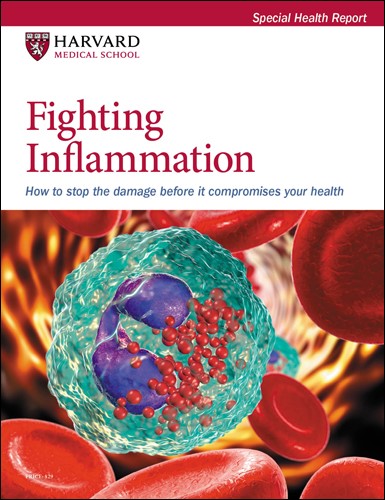Can medication tame chronic inflammation?
The answer isn't "yes" for everyone. Here's what you need to know about it.

Many diseases are marked by chronic inflammation — the persistent activation of the immune system. Although we have lots of medications to quiet acute (short-term) inflammation — like an attack of gout — they're not often effective in preventing chronic inflammation. And some people don't realize that. "I've had patients come in and say, 'I keep reading that inflammation is a killer. Can you give me something for it?' There's a lot of misconception about it," notes Dr. Robert Shmerling, a rheumatologist and medical editor of the Harvard Special Health Report Fighting Inflammation (/ui).
Understanding inflammationWhen the immune system is alerted to damage or danger in the body — such as infection or injury — it sends cells that fight invading microbes, clean up debris, and begin the healing process. The response is called acute inflammation, and it's temporary. But sometimes the immune response continues over a long period, injuring a specific part of the body. This chronic inflammation can be triggered by any number of inflammatory diseases, such as rheumatoid arthritis (which attacks the lining of the joints) or inflammatory bowel disease (which attacks the digestive tract lining). Chronic inflammation can also result from an unhealthy lifestyle — being sedentary, smoking, eating an unhealthy diet, not getting enough sleep, drinking too much alcohol, or being stressed all the time. Those habits promote inflammation throughout the body, and play a role in the development of Alzheimer's disease, heart disease, and diabetes. |
Medications
There are many medications to manage inflammatory disease. Here are some of the most common.
Nonsteroidal anti-inflammatory drugs (NSAIDs). NSAIDs such as ibuprofen (Advil, Motrin) inhibit compounds called prostaglandins that promote inflammation. "You might need ibuprofen to treat rheumatoid arthritis, especially if you're waiting for other medications to work better or deciding which medications to take," Dr. Shmerling says. NSAID risks, especially when taken long-term, include stomach ulcers, bleeding, and heart attacks.
Corticosteroids. These very powerful anti-inflammatory drugs, such as prednisone, suppress the immune system's ability to cause inflammation. They may be taken orally or by injection to treat inflammation that occurs anywhere — including the heart, lungs, feet (such as with gout), or gastrointestinal tract (for inflammatory bowel disease symptoms). You can also get joint injections of steroids to tame arthritis flare-ups. Steroids can have significant side effects like weight gain, bone thinning, and mood swings. For that reason, they are safest when used temporarily.
Immunosuppressants. These drugs, such as methotrexate (Rheumatrex, Trexall) or tofacitinib (Xeljanz), are chemical compounds that suppress the immune response by inhibiting the production of inflammatory substances. This can slow or even halt damage to the body from many kinds of disease, including rheumatoid arthritis, inflammatory bowel disease, lupus, or psoriasis. The drugs also reduce the body's ability to fight infection, so anyone using them must be monitored very carefully.
Biologics. Biologics — such as adalimumab (Humira), infliximab (Remicade), and etanercept (Enbrel) — are given as injections or infusions, and they suppress the immune system in a much more targeted way than most immunosuppressants. Biologics are derived from living cells, and they are engineered to target and block specific proteins or cells involved in inflammation. Since they are more selective than immunosuppressants, biologics are often more effective. But they, too, increase the risk for infection, and you must be monitored closely for infection if you take them.
Other approaches
Treating the underlying reason that triggers inflammation can be important. For example, taking pills to reduce levels of uric acid in your blood leads to fewer crystals getting into joints, thereby reducing attacks of gout.
To dampen chronic inflammation, make healthy lifestyle choices. "It's not a pill, but it's the best prevention measure we have to help people avoid chronic inflammation and its complications," Dr. Shmerling says. "It's inexpensive and has few side effects. And even making small improvements, like cutting out processed foods and taking a 10-minute walk each day, can make a difference."
Image: © seb_ra/Getty Images
About the Author

Heidi Godman, Executive Editor, Harvard Health Letter
Disclaimer:
As a service to our readers, Harvard Health Publishing provides access to our library of archived content. Please note the date of last review or update on all articles.
No content on this site, regardless of date, should ever be used as a substitute for direct medical advice from your doctor or other qualified clinician.
















